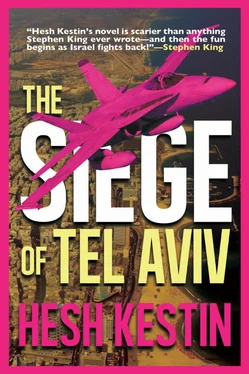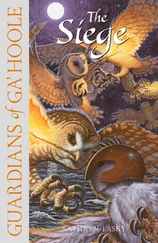Perhaps most damaging, Yigal is unable to go on the offensive regarding his opponent’s credibility—his own character questioned, he has no counterattack: the left-wing nominee spent the war as a prisoner of the Syrians in one of the most notorious POW camps, where he lost an arm to gangrene. The absence of this limb is on display before the nation. Yigal’s most cogent argument is a question: “In my place, what would you have done?” In reply, his opponent manages only partially to disguise a sneer: “I would have negotiated an honorable peace.”
After what can only be called a cataclysmic defeat, Yigal dedicates his energies to rebuilding Isracorp and to spending more time with Judy. They take a second honeymoon in Provence, under an assumed name renting a house overlooking a vineyard near Aix. The couple is so enamored of the peaceful setting they consider buying a second home in the area. But on a tour of available properties, they are interrupted by the arrival of three carloads of officers of la direction générale de la sécurité intérieure , the French equivalent of the FBI, who politely but firmly insist the couple must return to their villa and pack. Paris has learned that an Islamicist group centered in Marseilles has targeted them. The DGSI will provide protection until they return to Israel. After making a phone call to Jerusalem, Yigal tells them Israel will provide for their security. But this is not enough to satisfy Paris, which is less concerned about the lives of Yigal and Judy than the embarrassment of a violent incident in French territory—tourism remains the country’s main source of income.
In the private jet the DGSI provides for the flight from Nice to Ben Gurion, Yigal allows himself a moment of deep despondence in the knowledge that their life together will never return to what it was. But he says nothing: there is a good chance the two-person cabin crew serving them are French agents who speak Hebrew.
“Sweetheart,” Judy tells him. “Don’t be sad.”
“Arlingday, ethay abincay isway iredway.”
“Otay otequay Igalyay Evlay: Ifway ouyay esireday eacepay, eparepray orfay arway.”
“Ethay onnectioncay?”
“Ifway ouyay avehay otay otectpray ourselfyay, ependday onway ouryay ownway.”
He laughs. “Ethay Ionistzay anifestomay.”
“Iway ustjay antway otay ebay omehay.” She squeezes his hand. “Unnyfay, onlyway away ortshay ilewhay agoway Iway idnday’tay eelfay afesay inway Israelway oneway inutemay. Ownay Iway onday’tay eelfay afesay anywhereway elseway.” [4] “Darling, the cabin is wired.”
“To quote Yigal Lev: If you desire peace, prepare for war.”
“The connection?”
“If you have to protect yourself, depend on your own.”
He laughs. “The Zionist manifesto.”
“I just want to be home.” She squeezes his hand. “Funny, only a short while ago I didn’t feel safe in Israel one minute. Now I don’t feel safe anywhere else.”
ON THEIR RETURN, JUDY establishes a foundation to benefit the families of those killed during the war, both civilian and military. It becomes Israel’s leading charity, and for good reason. The numbers are staggering. With so many men killed, widows with young children are compelled to find work, of which there is plenty, but the national childcare system—with government kindergartens for children from the age of four—now must be expanded to include even infants. The government is not up to the challenge.
Judy enlists Hadassah, the worldwide Zionist women’s organization. With an international structure already in place, Jewish women everywhere contribute money and time. In a matter of months, infant care centers are set up in the big cities; within a year, there is not a village without one. Calling on Yigal’s connections with Israeli business leaders, Judy insists large companies set up crèches at the worksite. Where this is not possible, mothers are welcomed into the labor force through innovative schemes that include telecommuting and even home assembly of electronic components.
Under Judy’s guidance, Hadassah sets up a nonprofit bank to offer loans to war widows starting small businesses of their own. When it becomes clear that war widowers with young children find themselves in a parallel situation, Hadassah enlarges its safety net to include benefits for men. The second most popular name for Israeli daughters becomes Hadasssah .
The first is Judy . No one is more proud than her husband, though he sees his beloved so little he calls himself an honorary war widower.
Discharged after the war, Cobi declines to re-enlist and, in the tradition of many young Israelis following their military service, travels abroad before beginning university and annual reserve duty that will last until he is forty-eight. In Nepal, he meets a red-haired girl, also Israeli, also recently discharged. It turns out she knows a thing or two about Stinger missiles. Via Skype, their engagement is announced from Fortaleza, Brazil.
Staff Sgt. Abed Abu-Kassem of the Ghawarna retires from the IDF to become a member of Knesset on a far-right ticket—like most Bedouin, he is a born reactionary. Bedouin despise change.
Abu-Yunis, the Christian barber and entrepreneur, opens a restaurant with a Jewish partner. The restaurant is called Cousins . Between Jewish visitors and Christian pilgrims, there is never a day when its parking lot is not full of tour buses.
Ticky Pasha returns to England, where he spends his days in country pursuits—fly-fishing is not an option in Jordan—and his evenings writing his memoirs. Suppressed under the Official Secrets Act, they are not published. He never returns to Jordan.
There would be no point. Two years after the war, the Jordanian monarch is assassinated by a Hamas suicide bomber. Civil war breaks out between Jordan’s Bedouin and Palestinian citizens. The latter, aided by Palestinians flooding in from neighboring countries, are victorious. The Hashemite royal family is deposed and the country renamed the Republic of Palestine. In emulation of Zionism, it opens its doors to Palestinians from all over the Arab world and from as far away as South America.
Because the Palestinian leadership finds itself fully engaged with the construction of new towns and the infrastructure of a modern state, including such details as sewer systems and roads, it finally comes to terms with Israel. Under a secret memorandum of understanding, the Republic of Palestine will forego a standing army, its (once Jordanian) tanks, artillery, and missiles to be purchased by the IDF. In return, Israel pledges to defend Palestine’s borders from aggression by any neighboring country, its Red Sea port of Aqaba to be protected by the Israeli Navy. Moreover, a land corridor is established so that Palestinian agricultural and manufactured goods may be exported through the Israeli deepwater harbor at Ashdod, where Palestinian customs officials operate out of their own dedicated section of the port.
Muslim holy sites in Jerusalem continue to be administered by the Waqf, the Muslim religious council. Along with the blue and white flag of Israel, the newly designed flag of Palestine, a solid green banner, flies over the Mosque of Omar and the Dome of the Rock, which Israel has rebuilt.
The King of Saudi Arabia dies in his eighty-seventh year and is replaced by his thirty-six-year-old grandson, who faces enormous challenges. The flow of oil continues, but the riches have ceased, a situation that prevents the royal treasury from continuing to support the multitude of regional sheikhs on its payroll. The country quickly fragments, returning to the primitive tribalism that was its natural state before Saudi Arabia was formed after World War I.
Читать дальше












